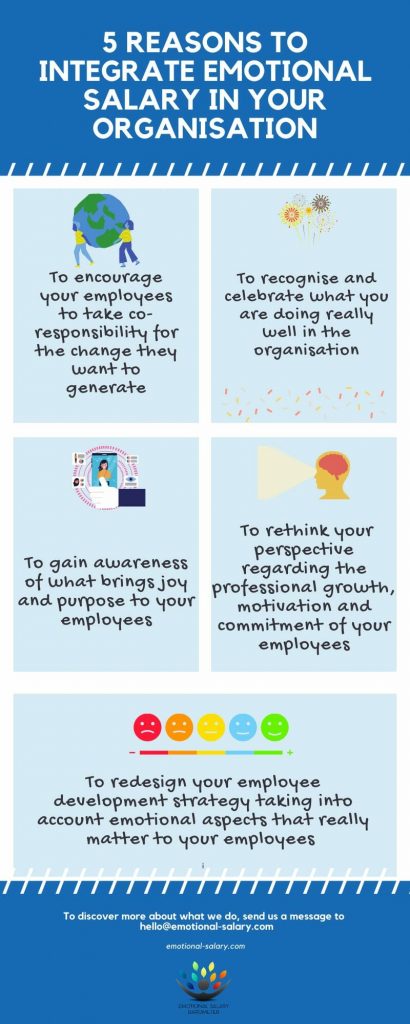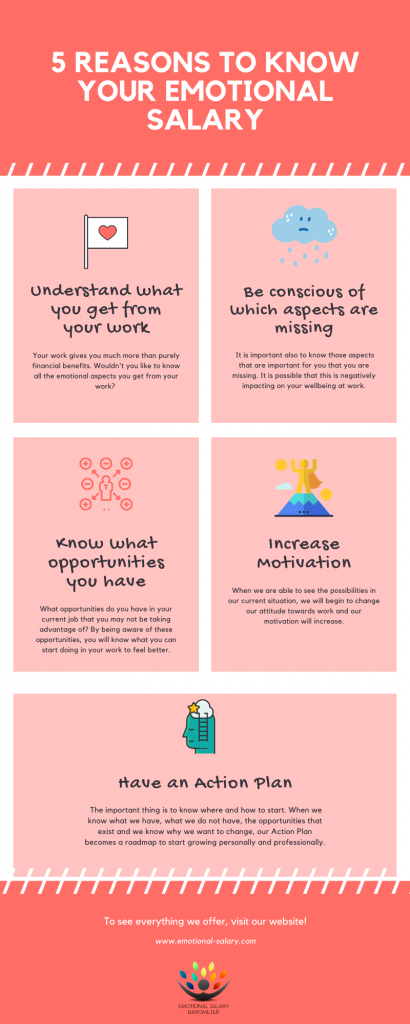In this blog I focus on the source question that started our reasearch on Emotional Salary, what misconceptions exist around the term and why measuring the emotional benefits we get from working is key to in the way we view work today.
Why do we work?
We began to research the term Emotional Salary after asking ourselves the following question: Why do we work? If we take the financial factor out of the equation, what are we left with? We spend so much time at work and it has such a significant impact on our lives. Isn’t there something else we get from work apart from the financial side?
And when we talk about removing the “financial factor” we are referring to the entire financial aspect, including any flexible remuneration (restaurant vouchers, insurance, pension etc.) that is part of the whole compensation pack. These flexible compensation packages are hugely valuable to employees. We do not want to a downplay them in any way.
Our intention in introducing the term Emotional Salary is to look at work from a purely emotional standpoint. When people think about their work we want them to take into consideration all the other possible gains that no one talks about. The reason for this is because these gains are truly important for our overall wellbeing, motivate us, change our perception of work and lead us to our personal and professional development.
The Emotional Benefits we get from working
The term Emotional Salary term refers to the emotional benefits we get from working. This is, all those non-monetary benefits we get from working in addition to our salary at the end of the month.
Normally, when we talk about the term Emotional Salary at events, training sessions, presentations or even in private conversations, we always find a strong interest from the public. People always want to know more about it, the elements that constitute it and the importance of taking the emotional benefits we get from working into account. Especially when we analyse work today and the role of work in the future.
However, some people are skeptical when discussing the emotional benefits we get from working. They see these emotional benefits as not relevant or important when discussing about work. Both reactions are normal. We spend a lot of our lives working and when we are working we experience a range of and positive and negative feelings.
The factors that constitute Emotional Salary
Our research has allowed us to recognize 10 factors that constitute the emotional benefits we get from working. However, as we are all unique individuals, each of us will have a different Emotional Salary score. That is, each and everyone of us will need, value and cherish different emotional aspects of work and will attach different levels of importance to each factor.
Taking this subjective aspect in consideration, when analysing a specific group, thanks to the digital era in which we operate, we can analyse the overall generated data and identify patterns that indicate trends, problems, areas to improve and areas to celebrate.
So now the term Emotional Salary is already becoming more tangible and something that provides us with personal solutions concerning our work and solutions to the objectives of our business strategies. We thus have a double-entry benefit:
- As individuals start becoming aware of their Emotional Salary and its consequences at a personal, professional and social level, they start taking responsibility for their Emotional Salary and their future. They will then start flourising in it.
- As a consequence, the organisation also grows, taking into account the Emotional Salary of the people who work for them.
Is Emotional Salary only a “good to have”?
Knowing, measuring, and becoming aware of the emotional benefits we get from working is crucial for us individuals and organisations. It allows us to take into consideration the following aspects of work:
- The possibility of seeing work as a platform for personal and professional growth;
- The emotional impact that the complex employer/employee relationship has on a person;
- The impact on health that work has as a result of the emotions we experience at work (such as lack of sleep, stress, muscle aches, back pain, etc.);
- That the needs or expectations an employee has from work go beyond the purely financial aspect;
- The great advantages for the business that can be obtained if the emotional aspects of work are taken into account.
Not seeing these aspects of work reflect also the values of a generation. Many of the people who are now in leadership positions are between 45 and 60 years old. Many of them grew up with the “success” values of the 1980s-1990s. The need to have profits at any cost year after year, in many cases cancelling or completely ignoring the cost or emotional impact that work has on people was part of the corporate game.
We sometimes still find a generation of leaders where, for many of them, it is normal to ignore the emotional impact that decisions such as mergers, leadership changes, forms of leadership, structures, etc. can have on individuals or teams.
Is a Low Emotional Salary Equal to an Emotional Tax?
The relationship we have with work is a complex relationship. It is a relationship where there are a number of emotions throughout the day, it has its ups and downs.
The word salary refers to a remuneration that we receive when working. This remuneration has only been referred to so far in relation to the financial part, but the question is why not see, consider, weigh, measure and also value the emotional aspect? What is that emotional salary that we are receiving? Or, to look at it from another perspective, what is the emotional salary that we are not receiving and, therefore, are we paying an emotional tax for working?
What exactly do we measure when talking about Emotional Salary?

When we analyse Emotional Salary, we explore the following:
- The factors that make up Emotional Salary;
- To what extent we perceive that we have those factors in our work;
- The opportunities that exist and are offered from work, that possibly we are not taking advantage of;
- Those aspects that I am not receiving, that are important to me and that are affecting me emotionally and physically.
The understanding of all these factors, opportunities and aspects is what constitutes the emotional benefits we get from working. When we do this analysis, our perception of our work changes. we realise what we have, but we also realise what we don’t have and how that is affecting us physically and emotionally.

Emotional Salary and the Future of Work
Only when we carry out this analysis and this assessment of the positive and negative aspects do we realize that our work is our responsibility. We are the ones who will ultimately make the decisions we consider appropriate for us, for our professional future and for our general wellbeing.
As one person told us after taking the Barometer, “I was not aware that you could perceive this at work.” What is not visible cannot be changed. This is absolutely crucial when we talk about measuring Emotional Salary. You have to be aware of all the factors that can comprise your Emotional Salary and look for opportunities to find them.
Because ultimately, the only person who knows what you want to get (or not get) emotionally from work is yourself. You are the only person who can and should weigh-up what you receive financially and emotionally from your work and decide if you are satisfied with what you are receiving or, if you want to to change it.
This is going to be especially important when we talk about the future of work, particularly when we see what has happened after the pandemic. The economic instability that is likely to continue means that organisations are going to be less and less able to offer their employees a secure career platform . Career and future decisions are in our hands.
The emotional benefits we get from working will be an essential aspect to take into account in the future, both for individuals and within organisations.
Some Final questions for you
When you reflect on your Emotional Salary, do you consider that it is high or low? What are the consequences of this and what can you do about it?
When you reflect on the Emotional Salary of your Team or Organisation, do you consider that it is high or low? What are the consequences of this and what can you do about it?
If you would like to find out more about your Emotional Salary or Emotional Salary in your team or organisation, you might be interested in the Emotional Salary Barometer. The ESB is a unique tool that measures an individual’s emotional salary and provides an overall score for emotional salary together with a score for each of the 10 factors and a detailed personalised report and action plan. You can take the Barometer here.
